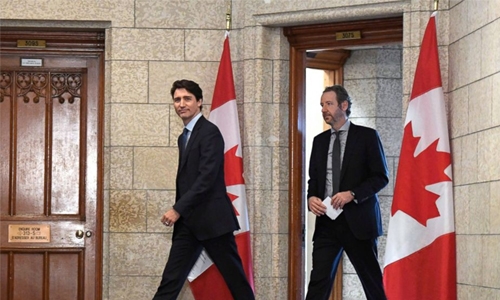Canadian politicians aren’t cute. They’re corrupt
There is a particularly quaint element to Canada — our smallness, our politeness, our insularity — that makes many people, including many Canadians, assume the best about our country and ourselves. As if these qualities make us inherently purer than other, more populous countries. It’s true that Canadians are a trusting, generous lot who generally believe in the greater good, institutions and the rule of law. Consequently, the country is prone to imagining itself more bound by a mythology of its own goodness than it actually is. But there’s a darker side to Canada’s smallness.
Our tiny network of political, business and intellectual elite is insular and concentrated. The scandal now enveloping Prime Minister Justin Trudeau — a bilingual, feminist, pro-multicultural liberal who embodies much of what we like to celebrate in our national character — should put an end to this. At its heart, the SNC-Lavalin scandal that threatens Trudeau’s leadership is about political interference in our judicial system. The Globe and Mail first reported in early February that last fall, the prime minister and his office pressured Jody Wilson-Raybould, then the justice minister and attorney general, to seek a Deferred Prosecution Agreement, which is equivalent to a plea bargain, for SNC-Lavalin, a politically well-connected civil engineering firm based in Montreal.
SNC-Lavalin has been at the centre of corruption scandals for decades. (In 2013, the World Bank debarred the company and more than 100 of its affiliates for 10 years, single-handedly putting Canada at the top of the bank’s corruption list.) In this latest scandal, the company faces criminal charges for bribing Libyan officials, including Moammar Gadhafi’s son, with millions of dollars to secure contracts in Libya. The Deferred Prosecution Agreement would permit SNC-Lavalin to avoid criminal prosecution, allowing it to continue to bid for domestic government contracts.
Without this, the company might face existential peril. The only person in Trudeau’s cabinet who seemed to push back was Wilson-Raybould. In January, she was put in charge of the Veterans Affairs Ministry, effectively a demotion. Last week, she went public, speaking before a House of Commons committee about the pressure she’d been under to cut a deal with SNC-Lavalin. For hours, she delivered extensive testimony, citing notes and texts, detailing inappropriate levels of political interference in a criminal proceeding. Her account was impossible to reconcile with Trudeau’s previous flat denials.
The prime minister and his defenders have come across as weak and dishonest, more interested in protecting a Quebec-based corporation than in the independence of the judiciary. His government is now in chaos. On March 4, one of his key cabinet ministers, Jane Philpott, resigned, saying she had “lost confidence in how the government has dealt with this matter and in how it has responded to the issues raised.” Trudeau came to power in 2015 on the promise of a new, revitalised Liberal Party, removed from the stale old boys’ club of yore.
The party, though it imagines itself as representing the quintessential ideals of Canadiana, has a long track record of corruption and chicanery, particularly in Quebec. With an electoral base in the country’s most heavily populated regions, like Quebec, the Liberals have enjoyed many decades in power. It is not without merit that they are referred to, derisively, as Canada’s Natural Governing Party. Power brings with it certain habits. This is true everywhere, but in a democratic country with a population the size of California spread across a gigantic landmass, influence runs in a geographic network that we describe in shorthand as the Laurentian Elite, after the St Lawrence River that runs through eastern Canada. Trudeau, the son of former Prime Minister Pierre Elliott Trudeau, is very much a creature of this elite.
And so is SNC-Lavalin. Not just any company gets its calls taken by the prime minister’s office. Founded in 1911, SNC-Lavalin is a crown jewel in the Quebec corporate firmament. The company’s lobbyists have long ties in both Conservative and Liberal governments. Its lawyers include a former Supreme Court justice. A retired senior federal official is on its board. One of its corporate directors also sits on the board of the Trudeau Foundation. Quebec’s public pension funds own about 20 per cent of SNC-Lavalin’s shares. The decision about SNC-Lavalin’s case was being made in the lead-up to Quebec’s Oct 1 provincial election — and that was apparently on the prime minister’s mind.
According to Wilson-Raybould’s testimony, senior staff members from Trudeau’s office said the company was threatening to relocate to London if it did not get the plea deal. One such staffer, she said, told her “if they don’t get a DPA, they will leave Montreal, and it’s the Quebec election right now, so we can’t have that happen.” Wilson-Raybould recounted a conversation with Trudeau: “At that point the prime minister jumped in, stressing that there is an election in Quebec and that ‘I am an MP in Quebec — the member for Papineau,’” she said. When she asked if he was trying to override her independence as attorney general, she said, the prime minister replied, “‘No, no, no, we just need to find a solution.’”
Wilson-Raybould was the first First Nations person to be appointed justice minister. She is a member of Parliament from Vancouver, British Columbia, to boot. By virtue of this background, she is not someone who has been historically well-represented in the cozy corridors of Canadian power. Why should she care about SNC-Lavalin? Why would she stake her independence and her reputation on the company’s survival?
It’s no coincidence that she was replaced at the justice ministry by David Lametti, a member of Parliament from Montreal who even now has not ruled out saving SNC-Lavalin with a Deferred Prosecution Agreement. The rule of law is a very grand Canadian virtue until, it seems, it proves to be a barrier to Liberal electoral prospects in Quebec. It is a small country, after all.
Related Posts

